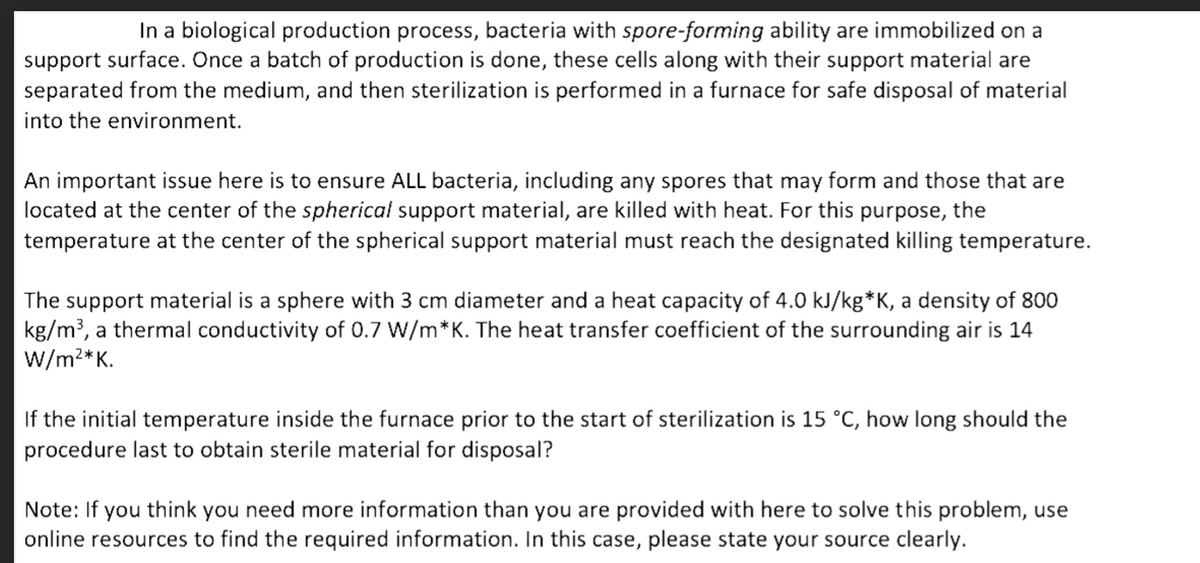In a biological production process, bacteria with spore-forming ability are immobilized on a support surface. Once a batch of production is done, these cells along with their support material are separated from the medium, and then sterilization is performed in a furnace for safe disposal of material into the environment. An important issue here is to ensure ALL bacteria, including any spores that may form and those that are located at the center of the spherical support material, are killed with heat. For this purpose, the temperature at the center of the spherical support material must reach the designated killing temperature. The support material is a sphere with 3 cm diameter and a heat capacity of 4.0 kJ/kg*K, a density of 800 kg/m3, a thermal conductivity of 0.7 W/m*K. The heat transfer coefficient of the surrounding air is 14 W/m2* K. If the initial temperature inside the furnace prior to the start of sterilization is 15 °C, how long should the procedure last to obtain sterile material for disposal? Note: If you think you need more information than you are provided with here to solve this problem, use online resources to find the required information. In this case, please state your source clearly.
In a biological production process, bacteria with spore-forming ability are immobilized on a support surface. Once a batch of production is done, these cells along with their support material are separated from the medium, and then sterilization is performed in a furnace for safe disposal of material into the environment. An important issue here is to ensure ALL bacteria, including any spores that may form and those that are located at the center of the spherical support material, are killed with heat. For this purpose, the temperature at the center of the spherical support material must reach the designated killing temperature. The support material is a sphere with 3 cm diameter and a heat capacity of 4.0 kJ/kg*K, a density of 800 kg/m3, a thermal conductivity of 0.7 W/m*K. The heat transfer coefficient of the surrounding air is 14 W/m2* K. If the initial temperature inside the furnace prior to the start of sterilization is 15 °C, how long should the procedure last to obtain sterile material for disposal? Note: If you think you need more information than you are provided with here to solve this problem, use online resources to find the required information. In this case, please state your source clearly.
Chapter2: Aquatic Plants And Animals
Section: Chapter Questions
Problem 2KA
Related questions
Question

Transcribed Image Text:In a biological production process, bacteria with spore-forming ability are immobilized on a
support surface. Once a batch of production is done, these cells along with their support material are
separated from the medium, and then sterilization is performed in a furnace for safe disposal of material
into the environment.
An important issue here is to ensure ALL bacteria, including any spores that may form and those that are
located at the center of the spherical support material, are killed with heat. For this purpose, the
temperature at the center of the spherical support material must reach the designated killing temperature.
The support material is a sphere with 3 cm diameter and a heat capacity of 4.0 kJ/kg*K, a density of 800
kg/m³, a thermal conductivity of 0.7 W/m*K. The heat transfer coefficient of the surrounding air is 14
W/m2*K.
If the initial temperature inside the furnace prior to the start of sterilization is 15 °C, how long should the
procedure last to obtain sterile material for disposal?
Note: If
you think
you need more information than you are provided with here to solve this problem, use
online resources to find the required information. In this case, please state your source clearly.
Expert Solution
This question has been solved!
Explore an expertly crafted, step-by-step solution for a thorough understanding of key concepts.
Step by step
Solved in 2 steps with 1 images

Knowledge Booster
Learn more about
Need a deep-dive on the concept behind this application? Look no further. Learn more about this topic, biology and related others by exploring similar questions and additional content below.Recommended textbooks for you



